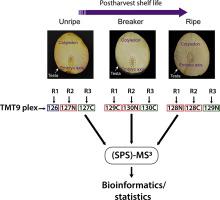Journal of Proteomics ( IF 2.8 ) Pub Date : 2021-01-13 , DOI: 10.1016/j.jprot.2021.104112 Janet Juarez-Escobar 1 , José A Guerrero-Analco 1 , Jesús Alejandro Zamora-Briseño 1 , José M Elizalde-Contreras 1 , Mirna V Bautista-Valle 1 , Esaú Bojórquez-Velázquez 1 , Víctor M Loyola-Vargas 2 , Martín Mata-Rosas 3 , Eliel Ruíz-May 1

|
Avocado is a nutritious and economically important fruit, generating significant income for exporter countries. Recently, by-products of this fruit such as seeds and peels, have raised interest in different industries. However, the biochemical features of the nutraceutical value of these tissues have not been analyzed using molecular approaches during the postharvest shelf life (PSL). We carried out comparative proteomics using tandem mass tagging (TMT) and synchronous-precursor selection (SPS)-MS3. We analyzed testa, cotyledon, and embryo axes from avocado seeds at detachment from the tree (unripe), and after five (breaker) and ten days (ripe) of PSL. We identified 1968 proteins, from which 933 were specific to the testa, 167 to the embryo axis, and 23 to the cotyledon. The testa had a more dynamic proteome than the other tissues, resembling similar stress responses to those observed in peel tissues, such as down-accumulation of translational machinery, cell wall catabolism and synthesis of secondary metabolites. In contrast, the up-accumulation of the biosynthesis of l-glutamine, L-isoleucine, and l-serine was observed in all tissues. Our study provides the basic biochemical and physiological features of avocado seed during PSL and demonstrates that avocado seed tissues could potentially be used as a costless source of high-value compounds.
Significance
Avocado seed as a fruit by-product is a source of different valuable molecules, including those with nutraceutical properties. During PSL, several biochemical and physiological modifications occur in this dispersal unit, which also includes the alteration of several key metabolites' content. However, the proteome profile associated with different metabolic pathways that regulate the inner content of seed metabolites has not been previously studied. Our tissue-specific proteomics TMT-SPS-MS3-based provides the first evidence of molecular and physiological changes in avocado tissues during PSL delivering fundamental knowledge of this organ. In this vein, the modulation of secondary metabolites, amino acid, and sugar metabolism of avocado tissues during PLS can encourage these by-products exploitation in multiple industries.
中文翻译:

鳄梨种子在货架期后的组织特异性蛋白质组学表征
鳄梨是一种营养丰富且经济上重要的水果,可为出口国带来可观的收入。最近,这种水果的副产品,例如种子和果皮,引起了不同行业的兴趣。但是,尚未在收获后的货架期(PSL)期间使用分子方法分析这些组织的营养价值的生化特征。我们使用串联质量标记(TMT)和同步前体选择(SPS)-MS 3进行了比较蛋白质组学。我们分析了鳄梨种子从树上分离(未成熟)以及PSL破碎5天(破碎)和十天后(成熟)后的鳄梨种子的睾丸,子叶和胚轴。我们鉴定了1968种蛋白质,其中933种对睾丸有特异性,167种对胚轴有特异性,而23种对子叶有特异性。睾丸的蛋白质组比其他组织更具活力,类似于在果皮组织中观察到的类似应激反应,例如翻译机能的向下积累,细胞壁分解代谢和次级代谢产物的合成。相反,1-谷氨酰胺,L-异亮氨酸和l的生物合成的积累在所有组织中均观察到-丝氨酸。我们的研究提供了鳄梨种子在PSL期间的基本生化和生理特征,并证明了鳄梨种子组织可以潜在地用作无价的高价值化合物来源。
意义
鳄梨种子作为水果的副产品是多种有价值分子的来源,包括具有营养特性的分子。在PSL期间,该分散单元发生了一些生化和生理学改变,其中还包括几种关键代谢物含量的改变。但是,与调节种子代谢物内部含量的不同代谢途径相关的蛋白质组图谱先前尚未进行过研究。我们的组织特异性蛋白质组学TMT-SPS-MS 3的基础提供了在鳄梨组织期间鳄梨组织分子和生理变化的第一个证据,从而提供了该器官的基本知识。在这种情况下,PLS期间鳄梨组织的次级代谢产物,氨基酸和糖代谢的调节可鼓励这些副产品在多个行业中的开发。











































 京公网安备 11010802027423号
京公网安备 11010802027423号